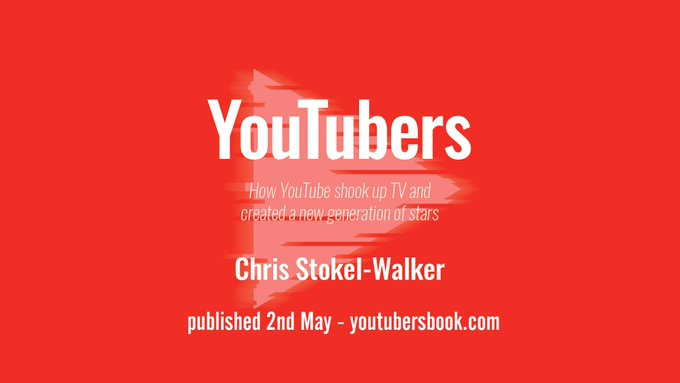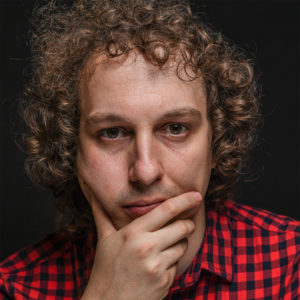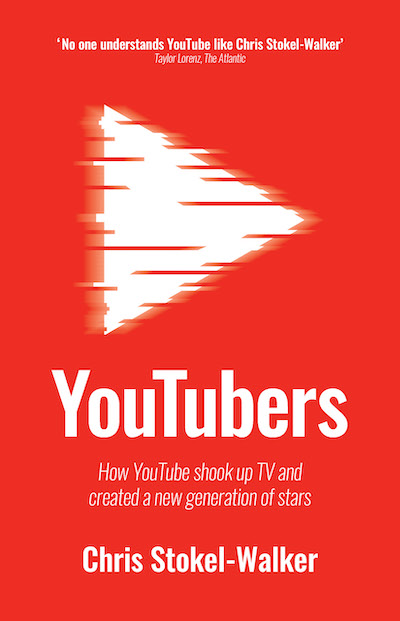Journalist as author: Chris Stokel-Walker – YouTubers

Chris Stokel-Walker is a freelance journalist who covers internet culture and technology for titles including WIRED UK and The Economist. His book “YouTubers: How YouTube shook up TV and created a new generation of stars” is out today, 2 May. Chris tells us a bit more about the background to the book and its significance for journalists, marketers and PR professionals who want to understand YouTube and its impact on the media.

Can you introduce your new book, YouTubers, in a couple of sentences?
The book looks at how YouTube has revolutionised and reshaped the media landscape: how and why we’re so addicted to it, what it means for the form of video, and how entire businesses have cropped up to produce these videos and to support the talent making them. It’s an attempt to distill down 14 years of the world’s biggest video sharing website into 352 pages, looking at how YouTube managed to worm its way into our lives, and going behind the camera with some of the world’s favourite creators to find out what their lives are like.
How did you come to write YouTubers?
YouTube has shifted almost imperceptibly into our lives in the last 14 years to become a major part of it. 1.9 billion of us use YouTube every month – which given half the world’s population doesn’t have an internet connection, and YouTube isn’t really accessible in China, a country of 1.4 billion people, is most of us. I’ve been reporting as a journalist on YouTube’s rise for magazines, newspapers and websites, but the one thing I’ve noticed is that there hasn’t been until now an in-depth, independent book about YouTube, its reach and its impact – so I figured I’d better write it.

Is there anything you’d like to explore further about YouTube’s culture?
I’m particularly keen to look at a couple of key aspects of the future of YouTube in further depth. The first is the business side – this is something that I’m expecting, based on conversations with industry insiders, some of which feeds into the book, to become much bigger in the coming years. The mechanisation of YouTube content, and the companies established to meet that requirement, is fascinating. Then I’m also keen to speak to more creators about their fears and their issues, not least what happens when you no longer feel like the person your fans think you are while on camera.
Can you tell us about your next project?
At the minute I’m currently focused on spreading the word about YouTubers and talking to as many people as possible about this platform that dominates our lives, yet we know so little about. Once that’s over – and I’ve slept for the first time in months – I’ll be looking at how this story can be told in other media, perhaps broadcast.
Any tips for other journalists thinking of writing a book?
The biggest tip I can give is to completely refigure your sense of time passing when writing a book and seeing it through to publication. A lot of the work I do is digital journalism, and so the turnaround time on a story can be an hour or two (or sometimes less). A first draft of this book was submitted to my publisher in December 2017. It’s been significantly updated since then, but the pace of production for a book is totally alien. Don’t get frustrated if things aren’t moving quickly.
What book(s) are you reading right now (or about to pick up)?
I tore through Emily Maitlis’s Airhead in half a day, and lapped up all the behind-the-camera stories in that. I’m also reading The Price of Paradise by Iain Overton, which is a history of the suicide bomber. Tough reading, but really interesting nonetheless.
Where can we read your everyday journalism?
I’m most often found at Wired UK, where I write about tech on pretty much a weekly basis, but otherwise you can find me in The Sunday Times, The Observer, The Economist and on the BBC website. It’s probably best to keep to up date with my work via Twitter – I’m @stokel.
Are you available for commissions?
Always: you can find my email address on my Twitter profile.
If I’m a PR professional/business with a story for you, can I get in touch (and what’s best for you)?
Of course: emails are best, though I get a lot of them every day. I’m the rare journalist who will try and reply to emails if something grabs them.
YouTubers (2/5/19 by Canbury Press) by Chris Stokel-Walker is available at http://www.youtubersbook.com, or https://www.canburypress.com/store/p28/-YouTubers-book-by-Chris-Stokel-Walker.html)
Connect with Chris via his publisher https://www.canburypress.com/contact.html or Twitter on @stokel

